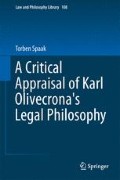Abstract
Olivecrona’s account of legislation follows a reliably realist pattern in that it is concerned not with the capacity of legislative products to establish legal relations, but with their capacity to cause human behavior. Rejecting as he does the view that legal rules have binding force and can confer rights and impose duties, Olivecrona argues instead that they are independent imperatives, which possess a suggestive character by virtue of which they influence the citizens (and the legal officials) on the psychological level. For, as we have seen, he holds that the citizens (and the officials) are disposed to obey the independent imperatives because they revere the constitution. On such a realist understanding of law, one important task for anyone who wants to understand legislation and its role in the world of law is to explain how the independent imperatives become incorporated into the legal machinery. Although such incorporation is of course mainly done nowadays through the process of legislation, Olivecrona points out that custom and judge-made law also play a role. In this chapter, I therefore present Olivecrona’s account of how legal rules become incorporated into the legal machinery by means of legislation, and to some extent by means of custom and judge-made law, and add a few critical remarks on this account.
Access this chapter
Tax calculation will be finalised at checkout
Purchases are for personal use only
Notes
- 1.
- 2.
Olivecrona does not use the term ‘non’cognitivism,’ however.
- 3.
- 4.
Olivecrona means by ‘the Diet’ a legislative body, such as the English Parliament or the US Congress.
- 5.
References
Articles
Berman, Harold J., and Colin Kaufman. 1978. The law of international commercial transactions (Lex Mercatoria). Harvard International Law Journal 19:2221–2277.
Frischkorn, Michael. 2005. Definitions of the Lex Mercatoria and the effects of codifications on the Lex Mercatoria’s flexibility. European Journal of Law Reform 7:331–351.
Koh, Harold Honghju. 2005–2006. Why transnational law matters. 24 Pennsylvania State International Law Review 24:745–753.
Olivecrona, Karl. 1951. Realism and idealism: Some reflections on the cardinal point in legal philosophy. New York University Law Review 26:120–131.
Stevenson, Charles Leslie. 1937. The emotive meaning of ethical terms. Mind, New Series 46:14–31.
Wintgens, L. J. 2006. Legisprudence as a new theory of legislation. Ratio Juris 19:1–25.
Wintgens, Luc, and Jaap Hage. 2007. Editor’s preface. Legisprudence 1:iii–iv.
Westerman, P. C. 2007. Governing by goals: Governance as a legal style. Legisprudence 1:51–72.
Books
Hayek, Friedrich A. 1973. Law, legislation, and liberty. Volume 1. Rules and Order. Chicago: The University of Chicago Press.
Hayek, Friedrich A. 1976. Law, legislation, and liberty. Volume 2. The mirage of social justice. Chicago: The University of Chicago Press.
Hayek, Friedrich A. 1979. Law, legislation, and liberty. Volume 3. The political order of a free people. Chicago: The University of Chicago Press.
Hellner, Jan. 1990. Lagstiftning inom förmögenhetsrätten: praktik, teori och teknik. [Legislation in the field of general property law: Practice, theory and technique]. Stockholm: Juristförlaget.
Kaufmann, Arthur. 1997. Rechtsphilosophie. 2nd ed. Munich: C. H. Beck.
Olivecrona, Karl. 1939. Law as fact. Copenhagen: Einar Munksgaard, London: Humphrey Milford.
Olivecrona, Karl. 1940. Om lagen och staten [On law and the state]. Copenhagen: Einar Munksgard, Lund: Gleerup.
Olivecrona, Karl. 1971. Law as fact. 2nd ed. London: Stevens & Sons.
Olivecrona, Karl. 1976. Rättsordningen [The legal order]. 2nd ed. Stockholm: Liber. (1st. ed. 1966).
Schafer-Landau, Russ. 2003. Moral realism. A defence. Oxford: Oxford University Press.
Author information
Authors and Affiliations
Corresponding author
Rights and permissions
Copyright information
© 2014 Springer International Publishing Switzerland
About this chapter
Cite this chapter
Spaak, T. (2014). Legislation. In: A Critical Appraisal of Karl Olivecrona's Legal Philosophy. Law and Philosophy Library, vol 108. Springer, Cham. https://doi.org/10.1007/978-3-319-06167-2_12
Download citation
DOI: https://doi.org/10.1007/978-3-319-06167-2_12
Published:
Publisher Name: Springer, Cham
Print ISBN: 978-3-319-06166-5
Online ISBN: 978-3-319-06167-2
eBook Packages: Humanities, Social Sciences and LawLaw and Criminology (R0)

